Mira's Diary (3 page)
Authors: Marissa Moss


“Why have creepy creatures on a church? It's like inviting demons rather than repelling them,” I said. “Why did Mom pick a gargoyle postcard?”
“She's protecting us from evil, obviously,” Malcolm drawled.
“Don't make fun that way,” Dad said. “Maybe she really is. You don't know.”
“You don't either,” Malcolm snapped. “You just want to forgive and forget.”
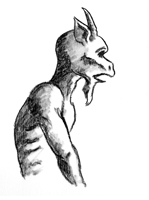
I didn't want a fight. Malcolm thought Dad was a doormat, letting Mom step all over him. Dad thought Malcolm was rushing to judge what he didn't understand. I thought they should both shut up. After all, we were in Paris, Mom or no Mom.
It seemed safer to walk away than try to stop them, so I squeezed past and studied the weird creatures perched on the edge of the walkway. Some gargoyles looked like bird-beasts, others like lion or wolf creatures. And there, right in front of me, was the one from Mom's postcard, a really creepy humanoid, reptilian thing with a stubby unicorn horn.
I knew you weren't supposed to touch the art, but I couldn't help myself. I felt drawn to the jutting brow, the goatish beard. The thing seemed so real, as if the demonic eyes would blink any minute. I reached out a finger and touched its shoulder, expecting the warmth of something alive. But the stone was cold, searingly cold, like ice. A shock ran through me as if I'd touched an electrical socket.
Now this is the freaky part, and I'm not sure how to explain it. When I touched that gargoyle, I saw flashes of it being carved in some dusty workshop by a pockmarked man in a leather vest. I saw it being hoisted onto the wall. I saw screaming mobs throwing torches and pulling down sculptures from the cathedral. I saw clouds race overhead, and the sun rise and set, each image passing so quickly in front of me that I couldn't grasp any details. I felt dizzy with all the changes and thought I would puke.
When it was over, I was alone on the gallery, queasy and shuddering. No tourists posing for pictures, no dad, no brother. Just me. And when I looked down at the broad plaza in front of the cathedral, there were no more souvenir hawkers or throngs of schoolkids. Instead men sauntered by in tall black hats, wearing elegant jackets and carrying canes. Women strolled in long skirts, twirling parasols over their shoulders. I blinked and looked again, trying to find the camera crew that must be filming the movie.
That's when I noticed that as far as I could seeâwhich was pretty farâthere wasn't a single car, bus, or taxi on the streets. There were horse-drawn carriages, some open, some closed, carts pulled by donkeys, and people walking. And here's the weirdest thingâthere was no Eiffel Tower, like it had been plucked off the landscape.
I was still in Paris. The question was when?

I wrote the date but I really had no idea what day or year or century it was. Just from the clothes I was wearingâno jeans or T-shirt, but a dark green dress with a tight waist and high, choky neckâI knew I wasn't in the twenty-first century, or even the twentieth. No cars, no airplanes, no TV antennas. No Dad or Malcolm either. But I was still holding my sketchbook. That's the only thing that was the same.

I touched the gargoyle again, but nothing happened. I touched all the gargoyles in a sweaty panic. No luck. I was still wearing a weird dress, and the Eiffel Tower was still gone. I wish I could say that I was brave and resourceful and figured out exactly what strange supernatural glitch had hurled me back in time. But I wasn't. I was knee-shaking, stomach-clenching scared.
“Okay,” I told myself. “You're alive and not hurt, so stay calm.” I took a deep breath and plunged back down the winding, dark staircase, holding up the annoying skirt to keep from tripping on it until I flung myself out into the glaringly sunny street.
And bumped right into someone.
“So sorry,” I babbled. “I couldn't see.”
The boy looked about my age, and that made him seem friendly. Even more friendly when he asked, “You are American?”
“Yes! And you speak English!”
“Some. The artist I work for likes to practice English and he helps me. His good friend is American and she helps me also. So with them both, I have two helps. Allow me to introduce myself. I am called Claude.”
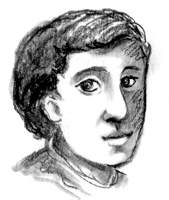
Claude was a terrible name for him because he wasn't cloddish at all. He was lean and muscular, with deep brown eyes, hair so black it had a blue sheen, and a lopsided smile. Maybe it was the cute French accent that went with the cute French face, or the adorable way he said “two helps.” Whatever it was, I felt I could trust him.
“Nice to meet you, Claude. I'm Mira.” Actually, this much I could say in French, but since he was speaking English, it seemed easier to stick with the language I knew best. “I know this sounds odd, but could you tell me what day it is?”
“Today is Tuesday.”
“I mean the date. And the year.” I hoped I didn't sound crazy.
“The second of April, 1881,” he said as if I'd simply asked the time.
Now I really thought I would throw up! What was I doing in 1881? How did I get here?
“Mademoiselle.” Claude took my elbow, supporting my suddenly jelly-filled legs. “You don't look well. If you like, I will accompany you to your hotel.”
I didn't know where to go or what to do. Did my hotel even exist in 1881? I mumbled the address.
“Place Sainte-Catherine?” Claude arched an eyebrow. “You are Jewish?”
Who says that? I wondered. The only time anybody asked me about my religion was when teachers wanted to know why I was absent on Rosh Hashana or Yom Kippur.
“I do not mean to pry. It is just that only the Jews live there. Nobody else wants to live with the Jews.”
Wow. I'd heard my grandparents tell stories about anti-Semitism, but it all seemed quaint and far away. I guessed in 1881, it wasn't so quaint. I considered saying I was a nice Christian girl. But only for a second.
“Don't worry about walking me to my hotel. I wouldn't want you to dirty yourself with my company.” If only he weren't so cute, I could have sounded snarkier. Instead I just sounded mad.
He laughed and took my arm. “It is not a problem.”
“Did I miss something? Aren't you worried about being with a Jew?”
“Mademoiselle Mira, I am Jewish. So now it is you who must worry.”
I felt like a total idiot. “Open mouth, insert foot.”
“What do you say? I do not understand.”
“Never mind,” I said. “Some things shouldn't be translated. Like my stupidity.”
I thought I would know the way back to the hotel but everything looked so different that I would never have found it without Claude. The narrow streets were crowded with carts, some pushed by men, others pulled by horses. A man selling umbrellas walked by, carrying his stock rolled up in a rug. Another man balanced a wooden board with loaves of bread on his head. Small stores sold wine or cheese or books, with barrels of wares set out before the windows. The streets were a strange mix of grubby dirtiness and smooth polish. Kids in rags jostled women in silks in front of elegant apartments alternating with ramshackle, dingy buildings.
We found the address but no hotel. Even if it had been there, my room had been reserved in 2012, not 1881. I pushed down the rising panic, but what was I supposed to do now? I didn't belong here!
I slumped down on a bench in the square, trying not to cry.
“I have a maid's room at the artist's house. We can ask the monsieur if you can stay with me,” Claude offered. If he thought I was an idiot for forgetting where my hotel really was, he didn't say. He was too sweet for that.
It was a long walk all the way to the artsy neighborhood of Montmartre. I almost suggested we take the metro, except of course there wasn't one in 1881. We turned off the broad tree-lined boulevard onto small streets that grew narrower, more winding, and steep. Now the houses weren't as grand, and alongside the small shops and homes, there were restaurants with large gardens. We passed vegetable plots, a small vineyard, a yard penning in goats and sheep, even a windmill. It seemed like there was as much farmland as houses, making this part of Paris feel like a country village. It was like I was walking in a painting or some period-piece movie.
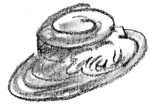
Then I saw herâMom! I swear it was her, only she was wearing 1881 clothes like everyone else. She had her hair tucked into a hat that looked like a puff pastry on her head and was sitting at a sidewalk café with a man sprouting a giant walrusy moustache. He looked like an unbaked biscuit with seeds for eyes.
“Mom!” I yelled, running toward her, stumbling on my stupid skirt and pointy-toed shoes. If I'd been wearing jeans and sneakers, I would have caught her. If she'd been a normal mother, she would have caught me. Instead she looked at me. And then she bolted.
“Mom!” I screeched, louder and shriller. “Where are you going? Why did you leave?”
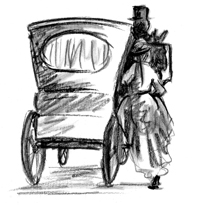
But there was no answer. She jumped into a waiting carriage and was gone. Disappearing again, this time right in front of my eyes.
“What is she doing here? Do you know?” I bellowed at the walrus man.
“Mira, calm down, please.” Claude took my arm. “What is wrong?”
“Just tell me,” I glared at Mr. Walrus, shooting all my rage at Mom through my eyes right into his doughy forehead.
“So sorry, mademoiselle! Sit down, please! Have a glass of water! A little calm, please!” The man was babbling, but he spoke good English.
“How do you know my mother?”
“She is a friend, nothing more. We have certain interests in common, that is all.” Mr. Walrus dabbed at his sweaty face with his handkerchief. “She told me that I might see you and I should say how sorry she is not to be with you. And she gave me this. For you.” He thrust out a pale blue envelope.
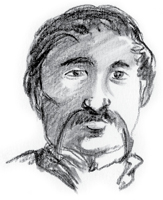
“She knew I'd be here?” Which was strangerâthat she expected me or that she was in 1881 Paris herself? Had she sent the postcard from this time? How could that be? I remembered the stamp looked old and so did the card, but I hadn't noticed the postmark. And why leave a letter for me instead of talking to me herself? It all smelled fishy.
“What exactly are your interests?” I asked, snatching the letter.
“I sadly cannot inform you of this. That is for your admirable mother.”
The man stood up, tipped his hat as if we'd had an ordinary polite chat, and waddled away like a demented penguin. I just stood there hating him. And crying like an idiot.
“Mira, please, explain me what is wrong.”
There was way too much to tell. So all I said was, “Let's go to your place.”
I guess he was trying to distract me because while we walked, Claude kept up a constant chatter. He told me about his work, running errands for the painter, a man who lived alone except for Claude and the housekeeper. He told me about all the important people who came to the studioâwriters, journalists, artists. He said a lot of names, and at first I didn't pay attention to them. I was thinking about Mom and the letter I was too scared to open.
